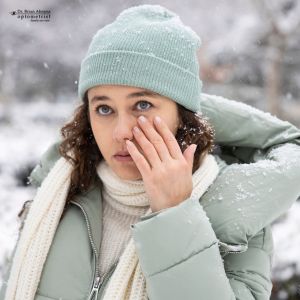Winter often brings a false sense of security when it comes to sun protection. The cooler temperatures and shorter days can make the sun’s impact on your eyes feel less significant, but the reality is quite different. Harmful UV rays are present year-round, and during winter, they can be even more intense, reflecting up to 80% of sunlight directly back into the eyes. Without proper precautions, prolonged exposure can lead to serious eye conditions, including photokeratitis and long-term damage like cataracts. For the high-level care and personalized recommendations, book an eye exam with your Dr. Brian Abrams, your trusted eye doctor in Vaughan. We will provide you with personalized eye care recommendations based on your health to help you preserve your health and avoid the need for emergency eye care this winter.
Whether you’re skiing down a mountain or simply taking a stroll in the brisk winter sun, protecting your eyes is essential to prevent long-term damage. Here’s how you can protect your eyes from the sun this winter.
Block UV Rays with Sunglasses
One of the most effective ways to filter sunlight exposure to your eyes is with high-quality sunglasses. Not all sunglasses are made equal so it’s important that you are vigilant of sunglasses that are not designed to offer significant UV protection. Check for labels that state “100% UV protection” or “UV400.” It’s important that you avoid sunglasses without clear UV protection markings. It also can help to choose polarized sunglasses which minimize glare and promote better visibility of the environment around you.

While some contact lenses do offer a level of UV protection, they fail to protect the entire eye. For the best protection, visit your local eye doctor in Vaughan for an eye exam. Dr. Brian Abrams will provide you with a selection of sunglasses that are proven to protect your eyes effectively. When you complete an eye exam and vision test, you can also customize your lens to ensure you can see clearly while using your sunglasses.
By opting for prescription sunglasses, you won’t have to worry about sun exposure if you switch to traditional eye glasses from sunglasses when you need to see better.
Winter Sports Goggles
If you are an avid participant in daytime winter sports such as snowboarding, skiing, and skating, you may need to take more robust protections to prevent snowblindness. The sun reflects in the daytime off of snow, and ice. Because in these environments the snow encompasses more of the landscape than a typical suburb or city, there’s a higher chance of sun damage to the eye. Many athletes, novice or professional, wear goggles that offer UV protection for more complete coverage of the eye. For the best recommendations for your eyes, book a consultation and eye exam with Dr. Brian Abrams in Vaughan.
Other Steps to Protect Your Eyes This Winter
Investing in your eye health is key during the winter. In addition to the snow and the sun, many people experience dryness and discomfort that is made worse by the cold weather, air, wind, and indoor heating. You can treat your eyes by using artificial tears or eye drops, reducing screen time, using a humidifier indoors, drinking water, and check-ins with your eye doctor in Vaughan.
Protect Your Eyes This Winter with Dr. Brian Abrams
Winter is just starting. Protect your eyes from the sun. If you notice symptoms of snowblindness including pain, blurry vision, swelling, and/or watery eyes, contact Dr. Brian Abrams right away for emergency eye care. For preventative care and personalized medical guidance, book an eye exam with our team.


